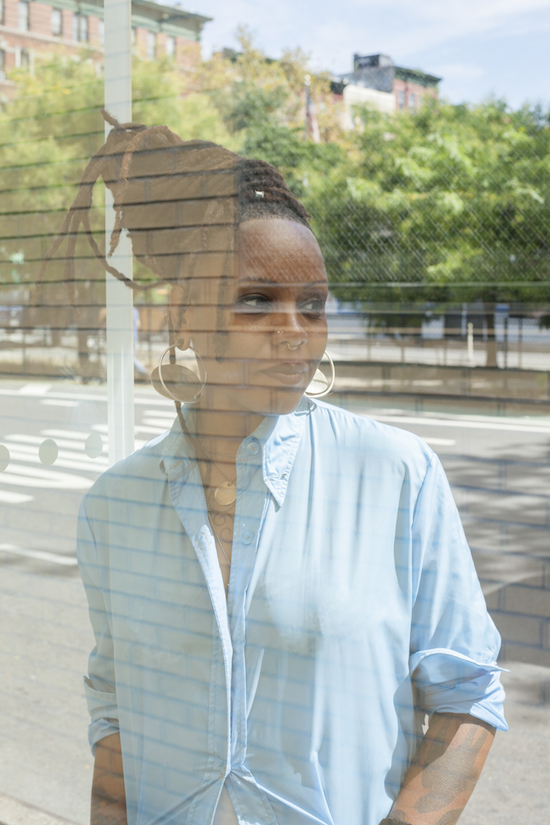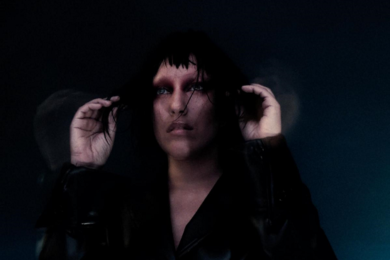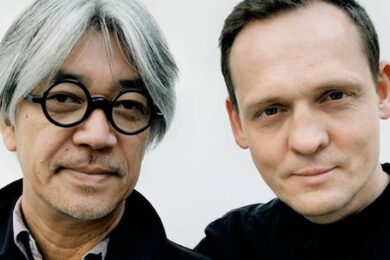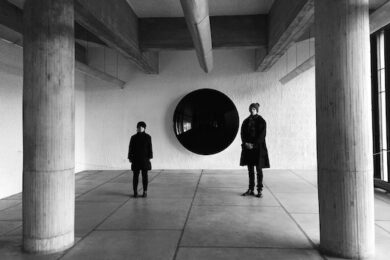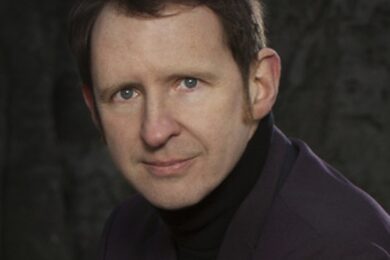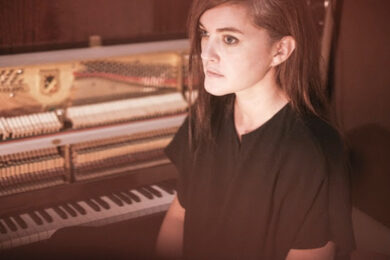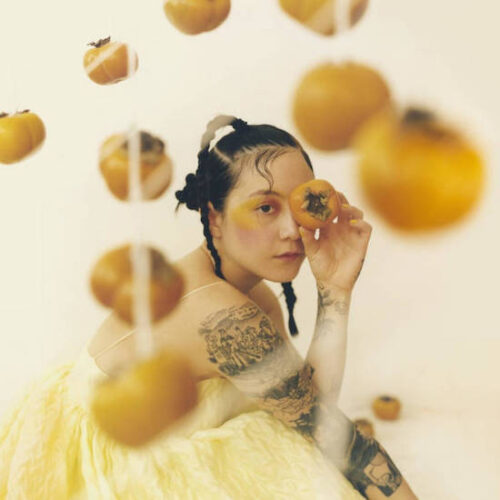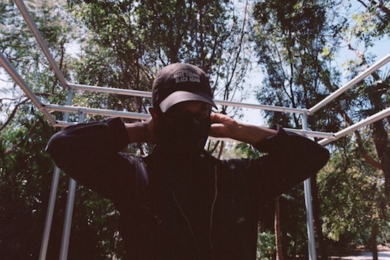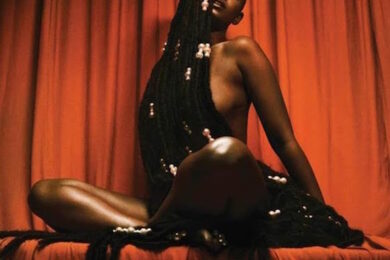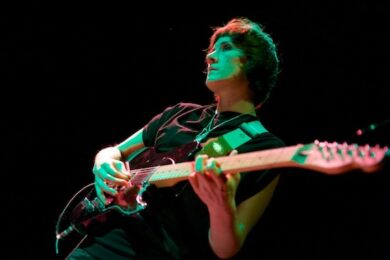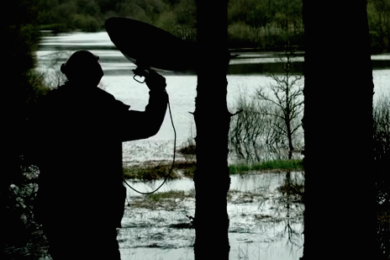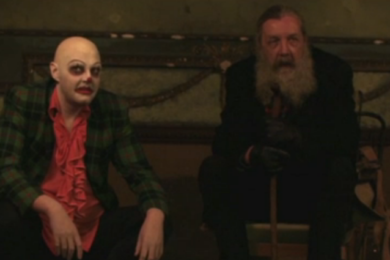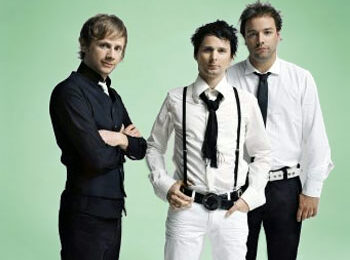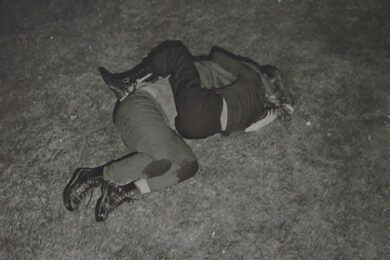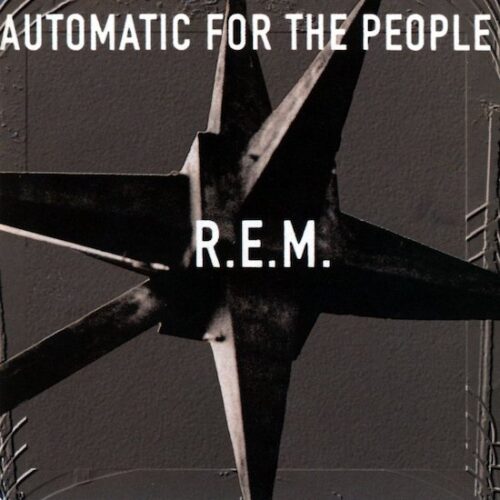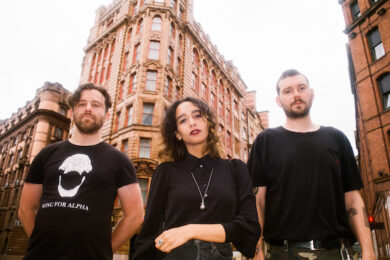Portrait by Jason Fulford
The Chicago-born, New York-based saxophonist, visual artist and composer Matana Roberts and Manchester sound artist/improviser Kelly Jayne Jones (White Death, Part Wild Horses Mane on Both Sides, Cooper-Jones Duo) come at their work in very different ways, but find common ground in their extra personal, intriguing approach to performance. They believe music should be democratic and shared; more for the audience and community than just the artist. In the past Roberts has said of her work, “At my artistic core, I am firmly dedicated to creating a unique and very personal experiential body of sound work that speaks to, and reminds people of all walks of life to reach, stand up, give voice, regardless of difference.”
A past member of Chicago’s Association For The Advancement Of Creative Musicians (AACM), Roberts composed Coin Coin, an ongoing 12-part musical series exploring themes of history, race, memory and ancestry using spoken word, free jazz, opera, blues and her own wailing vocals. In 2015 she took part in a residency at the Whitney Museum of American Art, exploring “the perplexities of what it means to be American in the twenty-first century”, and also regularly gives lectures and workshops on the American jazz tradition and how her own approach to improvisation has evolved over the years.
Jones takes her inspiration from musique concrète, working with tapes, rocks and flute not to mention using movement and audience interaction in her live performances. Her tactile installation-gigs often use lights, incense, books and precious stones to create a sensory experience, drawing from Eastern philosophies, psychotherapy and the unconscious to see if she can create some kind of transformative moment for her crowd.
After meeting last May in Manchester, Roberts and Jones have announced a new live collaboration, which will kick off a series of live shows programmed by OUTLANDS, a new UK touring network of experimental music. Part two in the OUTLANDS series will bring together multi-instrumentalist YoshimiO (Boredoms, OOIOO, SAICOBAB), avant-garde percussionist Susie Ibarra, and artist Robert Aiki Aubrey Lowe (Lichens), performing together as Yunohana Variations in June. For the first collaboration, Jones and Roberts have just finished a residency at Bristol’s Cube Cinema, before going on a UK tour as a duo. Jones will then lead experimental workshop sessions inspired by John Zorn’s Game Pieces.
How did you guys get talking last year?
Matana Roberts: It was not a meeting about collaborating, it was just a post-gig hang from what I can remember. Something that happens after most gigs I feel like. The quiet after the storm, ha ha. I don’t remember much, to be honest other than that she’s a lovely person. And that I enjoyed playing Manchester and also hearing her live set.
Kelly Jayne Jones: Hannah [Ellul] and Ben [Knight] from [Manchester underground label] Psykick Dancehall had really wanted to put Matana on for a while, and had organised that via Qu Junktions in Bristol, and I was supporting at that gig at Legroom. We had a few drinks back at Matana’s hotel and got talking about music communities, connections, group dynamics, the politics of all that, and how even if what we’re doing isn’t overtly talking about a specific politics, its existence is political. That really interests me. Matana’s mostly been involved in the jazz scene. We’re both part of an experimental DIY scene, we’re not talking about big music industry stuff, where you’re trying to make money. It’s not about capital, it’s about experiences and sharing, and building networks, communities. Maybe you’re drawn to someone with the same kind of belief structure.
There were lots of commonalities. I think we’re gonna show a film by [American feminist and science and technology theorist] Donna Haraway, Story Telling For Earthly Survival as part of our residency at Bristol’s Cube Cinema before the tour.
MR: The act of “making", being a maker is a political act in itself to me, so I just want creative folks to continue chasing creative lives, making work that speaks of their curiosity, joys, fears, interests. It all adds to the larger fabric of creative defiance in the face of ignorance, prejudice and every ‘ism you can think of, and can help make change even without trying to do that.
What did you know of each other’s music and artistic approach before you started collaborating?
MR: Nothing I’m embarrassed to say. This collaboration was put together by the good folks over at Qu Junktions. I’m always open for collaboration and trying new things with curious minds.
When they asked me about it, it immediately sounded like it could be a fun and a good learning experience. And from what I have gleaned since then, she has an interesting, robust inquisitive artistic practice. So I look forward to witnessing and exploring that.
KJJ: I saw Matana onstage at Supernormal and I’d watched some of her lectures online. She has an incredible way of communicating.
How did you both decide to approach the OUTLANDS project?
MR: Really time and travel constraints played a key role. Since we do not live in the same city and I travel so much, we have spoken about possible ideas over the phone and email. But I think we both are just trying to think of it as an open space of possibility, where anything can happen, I’m excited to see what might happen or not.
KJJ: We’re not going to force anything on it. We don’t have an agenda. Matana will bring her knowledge, her interests, her lived experience and I’ll do the same. We’ve had some exchanges on Skype, but we’ve not defined at all what we’re going to deal with, I guess it’ll evolve in the time we spend together. We have no precedent, every improvisation is a conversation. There are certain synergies already there. Maybe we’ll disagree? Each time you chat with someone, it’s an improvisation, it could go in so many directions, it’s complete chaos. It’s a sonic collaboration as well – it’s two performers on stage making sounds.
Kelly Jayne Jones performs Four Walls Black Hollow from Helga Fassonaki on Vimeo.
Can you give away any details about what the performances might involve?
MR: Well no, or maybe… I mean I can tell you my alto saxophone will be present and possibly a few electronic doo-dads. And that my creative spirit will be turned on, ready, willing, able to go on a sonic journey, but that’s about all I can say. But I’m pretty sure it’s going to be pretty fun!
KJJ: I need to take my flute, so I can have a conversation in a very musical way. We both like each others’ sound and energies, and we might use some texts as a starting point.
In the past Kelly has referenced shamanic rituals, precious stones, geology and religious rituals in her work, with neon lights and books by the Persian mystic poet Rumi and Scottish Modernist nature writer Nan Shepherd brought in to the performance space – and Matana has brought in powerful themes of supernatural forces, ghosts, the ephemeral and stuff bought in junk shops. Will you be drawing inspiration from those kinds of things again, or bringing in new themes?
MR: I’m not sure. It will depend on many factors. Not just Kelly and myself, but the spaces, the people, the weather, the sun, the moon, the universe, the general energy of the places we will inhabit and move through. I am excited to see what happens!
KJJ: I’ll be bringing my rocks. [laughs] They’re collaborators. They’re like little friends. They represent something really deep and important to me. I’ve been reading a lot about shintoism and animism, and consciousness and ritual. Sonically I really like them too! Not everyone likes the scraping sounds. I used to giggle, I used to get really embarrassed about it. Now I’m just like fuck it, it’s alright, I’m not a nutcase. [laughs]
Matana, you’re well known for your Coin Coin series which explored African-American history. Will this project be dealing with any of those themes again?
MR: The Coin Coin project is about themes in American history overall, which of course includes the trajectories of African slaves in America. The Coin Coin work and the methods I use in that work sometimes show up in other things, but’s a pretty unaware organic thing of my creative subconscious at this point so to be honest, I’m not sure.
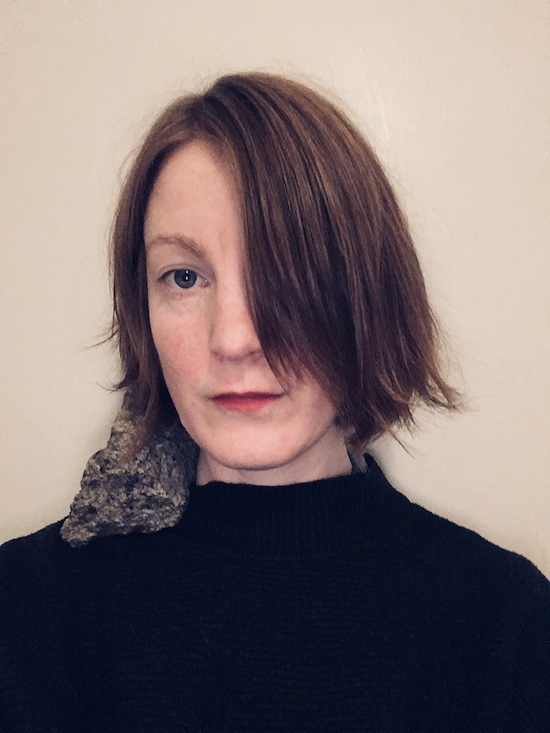
Portrait by Hannah Ellul
Kelly, you’ve often dealt with interpersonal relationships and spirituality in your work. Is that something you might revisit again?
KJJ: I got asked to do a workshop for Modul a few months ago, so I did one on power dynamics in improvisation. It was looking at the physical and emotional interactions that go on, thinking about performance, and asking what things people bring to the table. There were people who play guitars, laptops, analogue synthesisers, midis.
I study electro-acoustic composition at the University of Manchester and there were some people off that course too. What insecurities do people bring to a situation like that? About being too young, or not qualified enough, or what sounds they can make. It was a nice bonding session! I think I’ll be taking a version of that with me when I do the group workshops for OUTLANDS.
I guess I’m really interested in transactional analysis. I’ve had transactional analysis myself. I come from quite a difficult, traumatic childhood. How do you face that, and heal those wounds? Improvising is a transaction. Do you interject, or keep the peace? Even if you clash, that’s a transaction. I’m really fascinated by ideas of vulnerability and feeling exposed too. How do you work through them? I feel this responsibility towards other humans and the planet – that might sound terribly grandiose. But I’m aware that in a group, or in a live performance, you can really influence other people in a positive or negative way. It could change their life!
People come to a situation with their own traumas or wounds, sometimes, that’s passed down from childhood, or a country, or through big conservative, racist, sexist institutions. I want to hold that thought in my head when we perform – all those layers. You don’t need to be religious to take part in rituals. We all do. Capitalist ones. Spiritual ones. For me the Muslim call to prayer is one of the most sublime sounds. Or the music of the 11th century Christian composer and mystic Hildegard of Bingen, it’s just divine – excuse the pun! Or I remember I went to hear Janet Cardiff’s Forty Part Motet, at Newcastle’s Baltic, with forty speakers of recorded choir voices in a round. It was so overwhelming, and moving and beautiful. That’s spiritualism, but atheist.
I also remember my grandma was a Catholic who turned to Buddhism when I was little, and I’d go round to this Thai Buddhist monk’s little flat in an industrial estate on the edge of the Thames when I was about six or seven. There was a room full of incense and he’d teach us the chants in Thai, and he tied these three symbolic cotton strings around my wrist. I guess I’m still trying to tap into all these experiences, revisit them – we need them. I’m interested in creating heightened experiences, with sounds, definitely, but also using space as a tool, and thinking about how groups respond to them.
Or to put it another way, I want to do something that’s the absolute antithesis of when I opened for Sonic Youth years again with Part Wild Horses Mane On Both Sides. It was supposed to be this “breakthrough” moment, or this big “opportunity” and it was just horrible on every level. We were heckled onstage, we weren’t allowed to speak to the band, we were given these crap old sandwiches to eat that had been sat out all day . . . I was really out my comfort zone and I felt really vulnerable. It was a huge venue in Luxembourg, about 1,000 capacity maybe. Nothing rich or shared or unifying about that experience! I hope what Matana and I will do will allow people to feel in the moment, absorbing ideas and taking something away.
Matana Roberts and Kelly Jayne Jones are on tour now. Visit the OUTLANDS website for more details

